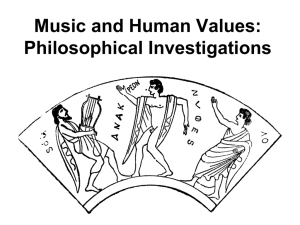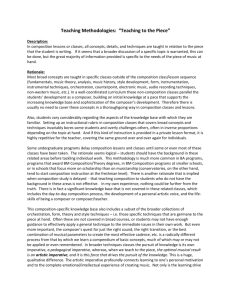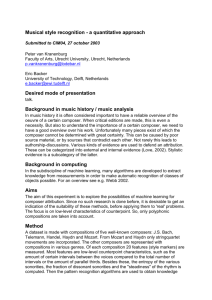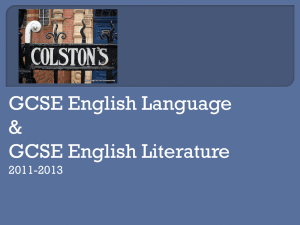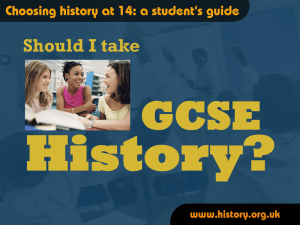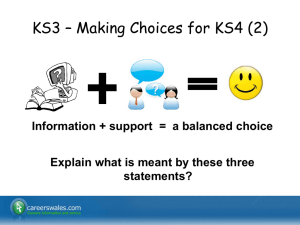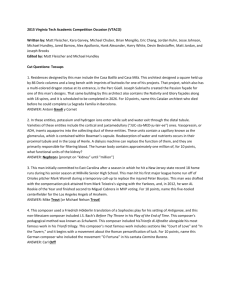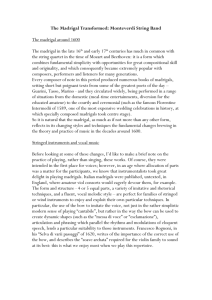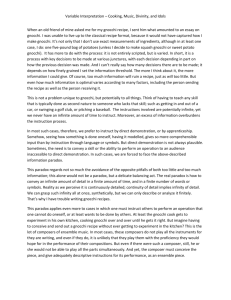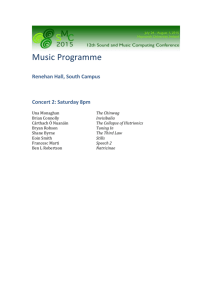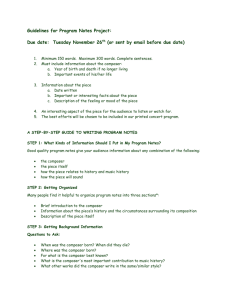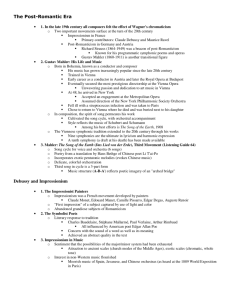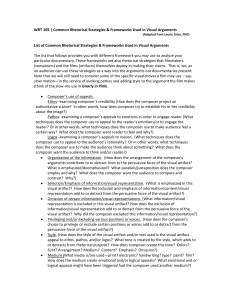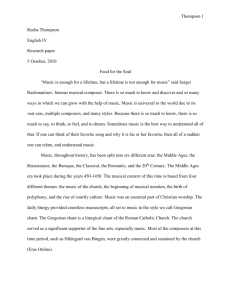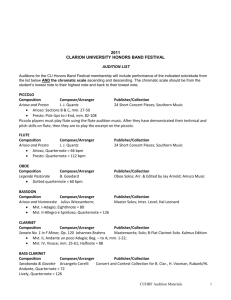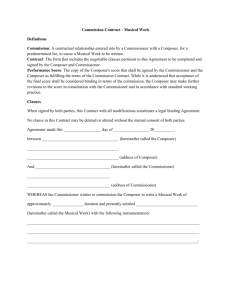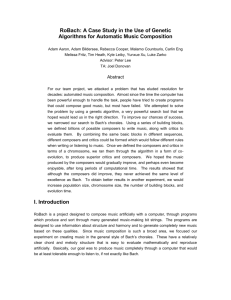TEACHING AND LEARNING COMPOSITION
advertisement
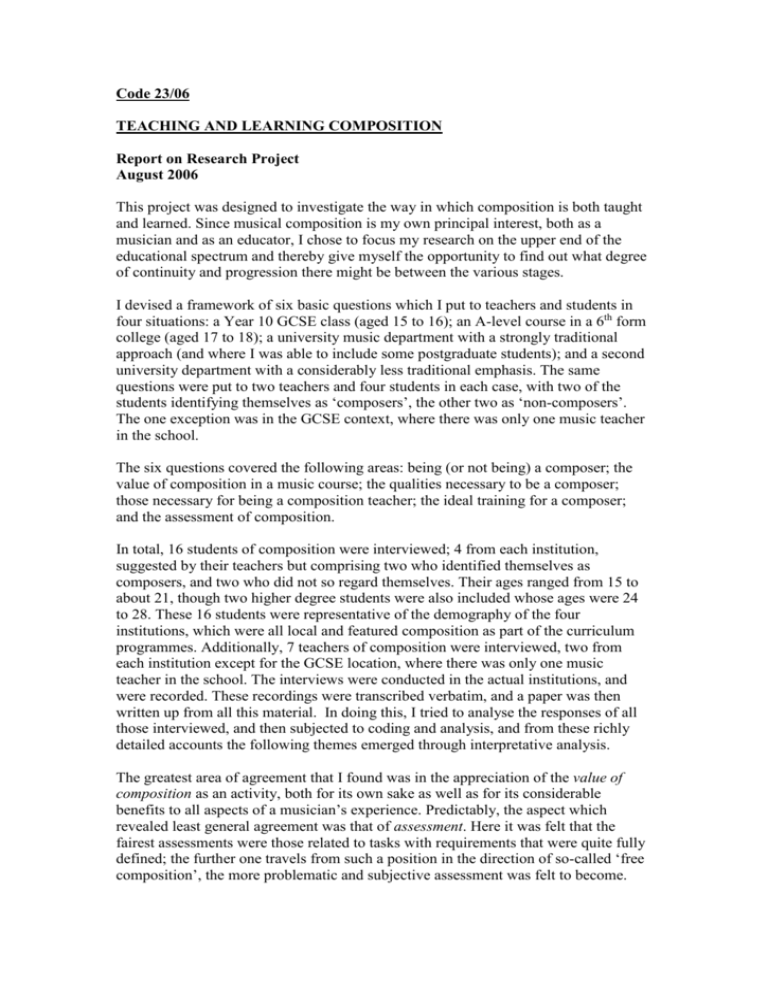
Code 23/06 TEACHING AND LEARNING COMPOSITION Report on Research Project August 2006 This project was designed to investigate the way in which composition is both taught and learned. Since musical composition is my own principal interest, both as a musician and as an educator, I chose to focus my research on the upper end of the educational spectrum and thereby give myself the opportunity to find out what degree of continuity and progression there might be between the various stages. I devised a framework of six basic questions which I put to teachers and students in four situations: a Year 10 GCSE class (aged 15 to 16); an A-level course in a 6th form college (aged 17 to 18); a university music department with a strongly traditional approach (and where I was able to include some postgraduate students); and a second university department with a considerably less traditional emphasis. The same questions were put to two teachers and four students in each case, with two of the students identifying themselves as ‘composers’, the other two as ‘non-composers’. The one exception was in the GCSE context, where there was only one music teacher in the school. The six questions covered the following areas: being (or not being) a composer; the value of composition in a music course; the qualities necessary to be a composer; those necessary for being a composition teacher; the ideal training for a composer; and the assessment of composition. In total, 16 students of composition were interviewed; 4 from each institution, suggested by their teachers but comprising two who identified themselves as composers, and two who did not so regard themselves. Their ages ranged from 15 to about 21, though two higher degree students were also included whose ages were 24 to 28. These 16 students were representative of the demography of the four institutions, which were all local and featured composition as part of the curriculum programmes. Additionally, 7 teachers of composition were interviewed, two from each institution except for the GCSE location, where there was only one music teacher in the school. The interviews were conducted in the actual institutions, and were recorded. These recordings were transcribed verbatim, and a paper was then written up from all this material. In doing this, I tried to analyse the responses of all those interviewed, and then subjected to coding and analysis, and from these richly detailed accounts the following themes emerged through interpretative analysis. The greatest area of agreement that I found was in the appreciation of the value of composition as an activity, both for its own sake as well as for its considerable benefits to all aspects of a musician’s experience. Predictably, the aspect which revealed least general agreement was that of assessment. Here it was felt that the fairest assessments were those related to tasks with requirements that were quite fully defined; the further one travels from such a position in the direction of so-called ‘free composition’, the more problematic and subjective assessment was felt to become. It was widely acknowledged that the drawing up of criteria for assessment was extremely difficult in the current state of music in a pluralistic, post-modern world. It was also felt that assumptions about music, which might have governed thinking about composition even as recently as 25 years ago, were no longer shared to anything like the same extent. There was general agreement about what kinds of attributes a composer needed to have. In addition to the musical and technical aspects, which can be developed and taught, it was widely acknowledged that a composer also required a variety of personal qualities like determination, willingness to experiment (confidence?) which can be encouraged but are not possible to teach. Although there was some disagreement about the necessity of a composition teacher actually to be a practising composer, this really concealed an underlying awareness that compositional experience was what counted. Among all of those interviewed who would identify themselves as composers, one of the most commonly cited spurs to start composing was beginning to learn an instrument. The organisation of a practice regime, with its attendant imposition of material to work on, created an appetite for the making of some new material. For many others of those interviewed, the GCSE syllabus itself was the spur towards taking an individual approach towards composing. Regarding the progression into GCSE into A-level, degree level and beyond, a number of difficult transitions can be discerned. The first of these is the need to acquire some kind of foundation in basic theory and notation at GCSE level, if a mainly ‘creative’ approach has been followed earlier in the school. To some extent, music technology can help to overcome some of these problems, though it was felt that the technology can bring some difficulties of its own. Mastery of the technology can only really be achieved by those already possessing considerably advanced theoretical and notational skills. Additionally, none of the GCSE students I spoke to had access to music technology outside the school environment. While GCSE would seem to be a successful preparation for A-level (at least in terms of composing), a new factor here at the higher level is that of risk. As the survey revealed, the assessment of composition at A-level might be regarded as the most risky area of the curriculum, and the most prone to subjectivity and discrepancies between the expected results and those actually achieved. Again, there are many teachers in HE who believe that A-level courses provide an inadequate preparation for degree level work. The visions of training courses for composers showed some considerable consistency about what was regarded as ideal. These features include as early a start as possible, with instrumental skills, a basic foundation of theoretical knowledge and technical proficiency being developed alongside the absorption of a wide range of music from different styles and backgrounds. Analysis and discussion of this music, and other cultural and philosophical concepts would be undertaken (probably in a group context, as the views of other student composers are considered to be often highly stimulating). An additional strand in the programme would see 1 to 1 teaching overseeing the writing of individual pieces with plenty of opportunity for workshop and public performances of work in progress as well as finished works. IT would seem to be mainly regarded as a convenience in the production of clear scores and parts, though a number of students would view technology itself as a viable medium. From this study, a number of issues now seem clearer to me, as both a composer and as a teacher of composition. The techniques of composition can indeed be taught, but the attributes of a composer can really only be encouraged (or indeed, discouraged) by the composing environment. The ideal curriculum would appear to me to be one where there was considerable exposure to, and analysis and discussion of, a wide range of contemporary idioms and techniques, coupled with ample time for one-toone consultation with an experienced but non-dogmatic composer/teacher. Furthermore, the possibility of good workshop realisations of student scores would also encourage the development of the self-critical attitudes needed by a composer. I gave a presentation, titled ‘Teaching and Learning Composition’, on this research at an East Anglian Researchers in Education (ARTS) seminar on 29 October 2005, and the findings will inform the musical strands in the M.Phil in Arts, Culture and Education. John Hopkins rev. 7 November 2006
